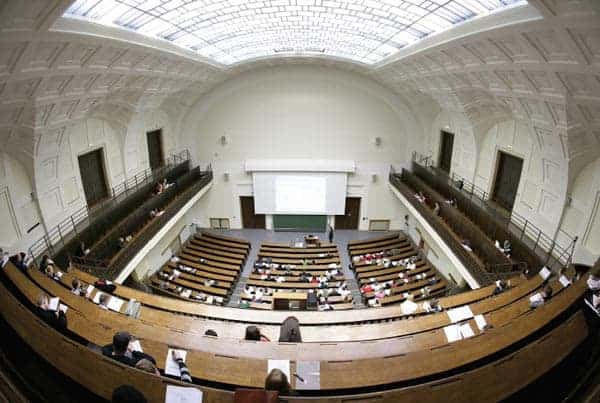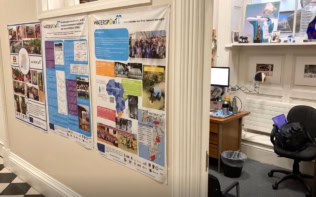David Griffiths says that the role of a physics teacher should be to illuminate the subject's intrinsic interest, beauty and power – and warns that attempts to make it more marketable using gimmicks, false advertising or dilution are bound to be counterproductive

My parents were professors (history and zoology), and they firmly believed that the purpose of education is to show students “how to think”. When I began teaching, I quickly discovered that many of my students could think much better – or at any rate much faster – than I could. What distinguished me from them was that I knew things that they did not, things they had been led to believe they ought to want to learn. I adopted a less-exalted goal: I think the purpose of education is to pass along to the next generation the accumulated knowledge and wisdom of humankind, and my role as a teacher is to make that process as efficient and palatable as possible.
Physics teachers are fortunate (I am among friends, so I can speak frankly): ours is a subject the relevance and importance of which are beyond question, and which is intrinsically fascinating to anyone whose mind has not been corrupted by bad teaching or poisoned by dogma and superstition. I have never felt the need to “sell” physics, and efforts to do so under the banner “physics is fun” seem to me demeaning. Lay out our wares attractively in the marketplace of ideas and eager buyers will flock to us.
What we have on offer is nothing less than an explanation of how matter behaves on the most fundamental level. It is a story that is magnificent (by good fortune or divine benevolence), coherent (at least that is the goal), plausible (though far from obvious) and true (that is the most remarkable thing about it). It is imperfect and unfinished (of course), but always improving. It is, moreover, amazingly powerful and extraordinarily useful. Our job is to tell this story – even, if we are lucky, to add a sentence or a paragraph to it. And why not tell it with style and grace?
Teaching concerns
If our subject were modern poetry, or French philosophy, then clarity would not necessarily be a virtue: part of the fun is figuring out what on earth the author is trying to say in such an obscure and convoluted way; and the actual content, once deciphered, turns out to be pretty trivial. A literature teacher who explains every simile and metaphor has robbed the subject of its interest.
But in physics there is no valid excuse for anything short of crystal clarity (unless the topic is so new that it is not yet fully understood). If a student who is reasonably competent, attentive and sober cannot understand an argument, then it is the teacher’s fault. I have known people who are in some sense too smart to be clear; they cannot remember what it was like not to understand something, because, I suppose, they never had this experience. They may be outstanding physicists, but they do not belong in the classroom. (There are exceptions: the most brilliant physicist I ever encountered, the late Sidney Coleman, was also – by far – the best and clearest teacher.)
In the US there is a movement inspired by physics education research (PER) to promote “active engagement” in the classroom. I applaud this – though it is hard for me to imagine any good teacher since Socrates who is not already practising it. But taken to extremes it can be destructive. When it is claimed, for example, that students learn nothing from lectures (because, apparently, they are not “actively engaged”) I demur. It goes without saying that there are bad lectures, but there are also very good ones, in which students are totally engaged. Nobody’s mind wandered during Coleman’s lectures. In despair over the ineffectiveness and unpopularity of traditional methods, some PER people advocate “learning by discovery” in the lab. It is a nice idea, but stultifying slow and inefficient – how are we to rediscover 500 years of physics in a semester? I can explain the conservation of momentum in 15 minutes, but three hours in the lab would only convince an honest student that the law is false.
The Harvard University physicist Eric Mazur and others have introduced flash cards (now – inevitably – replaced by electronic “clickers”) to enforce student engagement at lectures. They can be powerfully effective in the hands of an inspired expert like Mazur, but I have seen them reduced to distracting gimmicks by less-capable instructors. What concerns me, however, is the unspoken message reliance on such devices may convey: (1) this stuff is boring; and (2) I cannot rely on you to pay attention. Now, point (2) may be valid, but point (1) is so utterly and perniciously false that one should, in my view, avoid anything that is even remotely open to such an interpretation.
How often have we heard colleagues say, with a sigh and a roll of the eyes, “Today I have to teach about balls on inclined planes; what could be more tedious and dull?”. This attitude, of course, is communicated loud and clear to the students, who are promised, in compensation, “Next year you will get to the interesting stuff”. But rolling a ball down an incline is emphatically not tedious and dull. I am sure there exist genuinely boring subjects – accounting comes to mind – but physics is not one of them.
Take a closer look at the classical theory of rolling: why does a sphere roll faster than a hoop, and exactly how much faster? I think this analysis is one of the truly great products of the human mind – vastly greater (for all its simplicity) than the Born approximation or the Higgs mechanism. My job as a teacher is to call attention to its beauty – not to disparage it.
Ever since it was founded a century ago, all final-year undergraduates at Reed College have been required to write a thesis. We have been delighted (and, truth be told, smugly amused) at the recent enthusiasm at other institutions for undergraduate research – as though this were some extraordinary new invention. But let us be honest about what we are calling “research”. Is it merely an activity that is conducted in a lab or a library, or is it a way of learning – a protocol for discovery? If a student walks into an established lab, is told how to operate an instrument, records some data and enters them into an existing computer program, is this really “research”?
At Reed we try to involve students in all aspects of the project: choosing the question; designing the mode of attack; mastering the background literature; carrying out the experiment (or the calculation); presenting the results in a seminar; and (in some cases) writing it up for publication. It is true that such a project tends to be more modest than most professional research, but the student emerges with a real sense of ownership and understanding.
Abstraction is the enemy of learning – it is the end, not the beginning, of understanding. Mathematicians cannot comprehend this, and I suppose it is conceivable that their brains are wired differently. But most physics students learn by proceeding from the concrete to the abstract, not the other way around. It is the universal blunder of lecturers just starting out in their careers to go straight for the most sophisticated formulation – the one they recently learned in graduate school, and to which they are still in thrall. They want to start every problem with a Lagrangian, even if Newton’s laws would do it much more simply. This is like trying to potty-train a two year old on a full-sized toilet: exciting to the parent, perhaps, but frightening to the child, and potentially dangerous. Our business is to empower students, not to impress them; to instil confidence (“I could have done that!”), not awe (“How did they do that?”). The simplest tool is almost always the best one.
Educating physicists
I have been lucky. I spent most of my career at an institution where the students are reasonably bright and extraordinarily motivated, where effective teaching is genuinely encouraged and appreciated, and where I have enjoyed the freedom to pursue whatever strikes me as interesting and important. I have never suffered the interference of a brainless dean concerned only with grants and publications, and as a consequence I have been more productive than would have been possible in the usual academic straitjacket. I do not know what makes good teaching, beyond the obvious things: absolute command of the subject; organization; preparation (I write out every lecture verbatim the night before, though I never bring my notes to the lecture hall); clarity; enthusiasm; and a story-teller’s instinct for structure, pacing and drama. I personally never use transparencies or PowerPoint – these things are fine for scientific talks, but not in the classroom. I want my students to know that something is happening in real time: I am thinking through each argument as I present it, not merely reciting something they might just as well have read in a book.
Learning physics is hard, and it can be frustrating; there is no point in concealing this or (far worse) watering it down in a futile at_tempt to make the subject more marketable. Serious students relish a genuine challenge; they do not like being coddled, patronized or made to feel stupid, and they resent meaningless hurdles – tedious lab sessions, plug-in problems, trick questions, unfair examinations and confusing explanations. Studying physics is often represented as a brutal and unforgiving ascent whose main reward is a sense of snide superiority over those who struggle below. To my mind the worst aspect of this culture is that it tends to select for nasty childish temperaments, and in particular to drive women out of the field.
This is a terrible shame. I believe every educated person should study physics. Why? Because it is interesting – the natural world is a remarkable and fascinating place; because it is liberating – the universe is not arbitrary, but rational and comprehensible; and because physics is unequivocally the most powerful and profound system of thought ever devised. Perhaps, after all, I do agree with my parents. My purpose is to teach students how to think, by exposing them to the most brilliant and successful example of human thought: physics.



